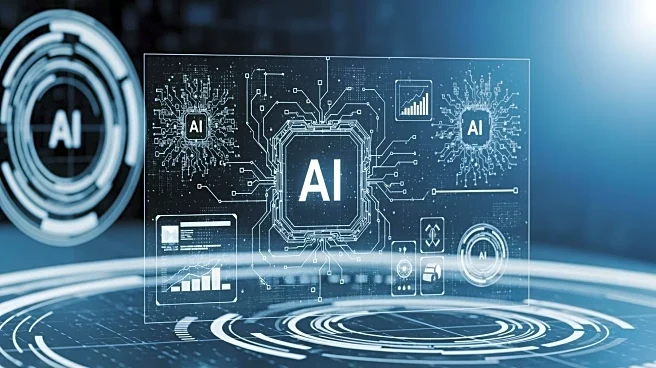What's Happening?
Recent research from Marketing Week's 2025 State of B2B Marketing indicates that three-quarters of B2B marketers have seen a significant increase in the focus on artificial intelligence within their businesses
over the past year. This trend is evident in both small and medium-sized enterprises (SMEs) and large corporations. Despite the growing emphasis on AI, 51.5% of marketers report a skills gap in their departments, particularly concerning AI capabilities. This gap is more pronounced in large organizations, where 58.6% of marketers acknowledge the issue. Despite these challenges, B2B marketers are actively experimenting with AI technologies, with nearly half using generative AI tools like ChatGPT, Microsoft Copilot, and Google Gemini for tasks such as content creation, creative ideation, and market research.
Why It's Important?
The skills gap in AI among B2B marketers is significant as it could hinder the effective implementation and utilization of AI technologies in marketing strategies. As AI becomes increasingly integral to business operations, marketers who lack the necessary skills may struggle to leverage these tools effectively, potentially impacting their competitiveness and innovation. The gap also highlights the need for targeted training and development programs to equip marketers with the skills required to harness AI's full potential. Companies that address this gap may gain a competitive edge by optimizing their marketing efforts and improving decision-making processes through advanced AI applications.
What's Next?
As the focus on AI continues to grow, businesses may need to invest in training programs to bridge the skills gap among marketers. This could involve partnerships with educational institutions or specialized training providers to develop comprehensive AI curricula tailored to marketing needs. Additionally, companies might explore hiring AI specialists or consultants to guide their marketing teams in effectively integrating AI technologies. The ongoing evolution of AI tools and their applications in marketing will likely drive further innovation and require continuous adaptation from marketers to stay ahead in the competitive landscape.
Beyond the Headlines
The AI skills gap in marketing departments not only affects immediate business operations but also poses long-term implications for the industry. As AI technologies evolve, marketers will need to adapt to new tools and methodologies, potentially reshaping traditional marketing roles and strategies. This shift may lead to a reevaluation of marketing education and professional development, emphasizing AI literacy as a core competency. Furthermore, ethical considerations surrounding AI use, such as data privacy and algorithmic bias, may become increasingly relevant, requiring marketers to navigate complex legal and ethical landscapes.









